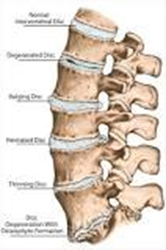A nurse is caring for a client who has degenerative disc disease. Which of the following assessment findings should the nurse understand might develop with this condition?
(Select All that Apply.)
Hyponatremia
Paresthesia
Foot drop
Intermittent pain Hyperreflexia
Correct Answer : B,C,D
Choice A Reason:
Hyponatremia is incorrect. Hyponatremia refers to low sodium levels in the blood and is not typically associated with degenerative disc disease. This finding is unrelated to the pathophysiology of DDD.
Choice B Reason:
Paresthesia is correct. Yes, paresthesia, which refers to abnormal sensations such as tingling, numbness, or burning, can develop with degenerative disc disease. Nerve compression or irritation due to disc degeneration can lead to paresthesia in the affected area, typically radiating along the nerve pathway.
Choice B Reason:
Foot drop is correct. Yes, foot drop can develop with degenerative disc disease, especially if the condition leads to nerve compression or damage in the lumbar spine (lower back). Foot drop refers to difficulty lifting the front part of the foot due to weakness or paralysis of the muscles involved in dorsiflexion.
Choice D Reason:
Intermittent pain is correct. Yes, intermittent pain is a hallmark symptom of degenerative disc disease. Pain may vary in intensity and may worsen with certain movements or activities. Individuals with DDD may experience episodes of acute pain, as well as chronic, persistent discomfort.

Nursing Test Bank
Naxlex Comprehensive Predictor Exams
Related Questions
Correct Answer is ["A","D","E"]
Explanation
Choice A Reason:
"Are you having any feelings of depression?". This statement is appropriate. Migraines can significantly impact mood, and depression is a common comorbidity in individuals with chronic migraines. Inquiring about feelings of depression allows the nurse to assess the client's mental health status and provide appropriate support or referrals if needed.
Choice B Reason:
"Are you experiencing any sensitivity to light?": This statement is inappropriate. This question addresses a physical symptom commonly associated with migraines rather than psychosocial impact.
Choice C Reason:
"Are you feeling any increase in your sexual drive?"Migraines are more likely to decrease sexual drive due to pain and fatigue. This question is not typically relevant to the psychosocial impact of migraines.
Choice D Reason:
"Are you experiencing any episodes of 'panic-type' feelings?" This statement is appropriate. Migraines can sometimes trigger anxiety or panic attacks in affected individuals. Inquiring about panic-type feelings allows the nurse to assess the client's emotional response to migraines and provide interventions or referrals for anxiety management if necessary.
Choice E Reason:
"Are you experiencing more fatigue as compared to before you had migraines?": This statement is appropriate. Fatigue is a common symptom associated with migraines, both during and after an attack. Assessing the client's level of fatigue helps the nurse understand the impact of migraines on the client's energy levels and overall functioning.
Correct Answer is ["A","B","D"]
Explanation
Choice A Reason:
Genetics is correct. There is evidence to suggest that genetics play a role in the development of multiple sclerosis. Although no single gene has been identified as the cause of MS, certain genetic variations have been associated with an increased risk of developing the disease. Having a first-degree relative with MS increases an individual's risk, although the overall genetic contribution to MS susceptibility is thought to be relatively modest.
Choice B Reason:
Environmental factors is correct. Environmental factors are believed to play a significant role in the development of multiple sclerosis, particularly in individuals with a genetic predisposition. Factors such as vitamin D deficiency, smoking, exposure to certain infections (such as Epstein-Barr virus), and geographic location (latitude) have been implicated as potential triggers for MS development.
Choice C Reason:
Upper respiratory infections is incorrect. While infections may trigger exacerbations or relapses in individuals with existing multiple sclerosis, there is limited evidence to suggest that upper respiratory infections contribute directly to the development of MS. However, some research suggests that viral infections, particularly those occurring during childhood or adolescence, may influence the risk of developing MS later in life.
Choice D Reason:
Autoimmune factors is correct. Multiple sclerosis is widely recognized as an autoimmune disease, characterized by immune-mediated inflammation and damage to the central nervous system. In MS, the immune system mistakenly attacks myelin, the protective covering of nerve fibers, leading to demyelination and neurological dysfunction. Autoimmune factors are therefore considered central to the pathogenesis of MS.
Choice E Reason:
Urinary tract infections is incorrect. While urinary tract infections (UTIs) are common in individuals with multiple sclerosis due to bladder dysfunction associated with the disease, there is no direct evidence to suggest that UTIs contribute to the development of MS.
Whether you are a student looking to ace your exams or a practicing nurse seeking to enhance your expertise , our nursing education contents will empower you with the confidence and competence to make a difference in the lives of patients and become a respected leader in the healthcare field.
Visit Naxlex, invest in your future and unlock endless possibilities with our unparalleled nursing education contents today
Report Wrong Answer on the Current Question
Do you disagree with the answer? If yes, what is your expected answer? Explain.
Kindly be descriptive with the issue you are facing.
